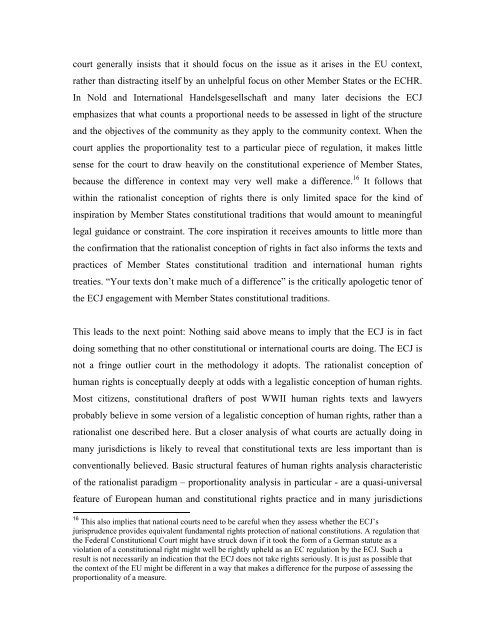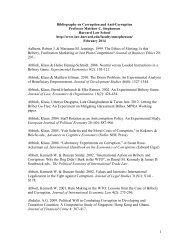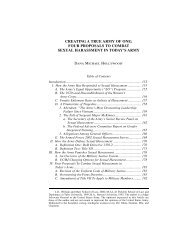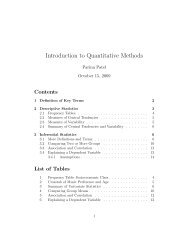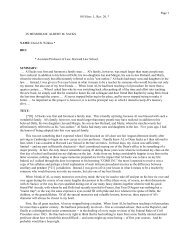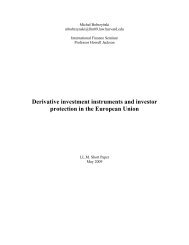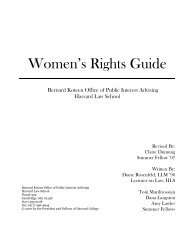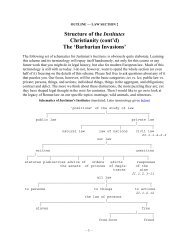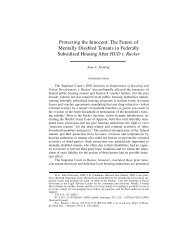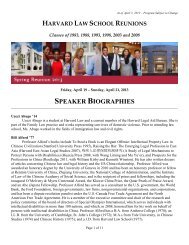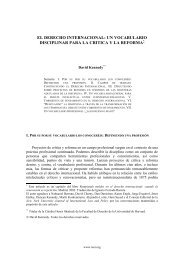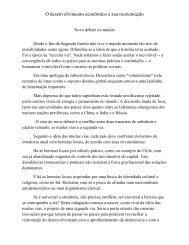Internationale Handelsgesellschaft, Nold and the New Human ...
Internationale Handelsgesellschaft, Nold and the New Human ...
Internationale Handelsgesellschaft, Nold and the New Human ...
You also want an ePaper? Increase the reach of your titles
YUMPU automatically turns print PDFs into web optimized ePapers that Google loves.
court generally insists that it should focus on <strong>the</strong> issue as it arises in <strong>the</strong> EU context,<br />
ra<strong>the</strong>r than distracting itself by an unhelpful focus on o<strong>the</strong>r Member States or <strong>the</strong> ECHR.<br />
In <strong>Nold</strong> <strong>and</strong> International <strong>H<strong>and</strong>elsgesellschaft</strong> <strong>and</strong> many later decisions <strong>the</strong> ECJ<br />
emphasizes that what counts a proportional needs to be assessed in light of <strong>the</strong> structure<br />
<strong>and</strong> <strong>the</strong> objectives of <strong>the</strong> community as <strong>the</strong>y apply to <strong>the</strong> community context. When <strong>the</strong><br />
court applies <strong>the</strong> proportionality test to a particular piece of regulation, it makes little<br />
sense for <strong>the</strong> court to draw heavily on <strong>the</strong> constitutional experience of Member States,<br />
because <strong>the</strong> difference in context may very well make a difference. 16 It follows that<br />
within <strong>the</strong> rationalist conception of rights <strong>the</strong>re is only limited space for <strong>the</strong> kind of<br />
inspiration by Member States constitutional traditions that would amount to meaningful<br />
legal guidance or constraint. The core inspiration it receives amounts to little more than<br />
<strong>the</strong> confirmation that <strong>the</strong> rationalist conception of rights in fact also informs <strong>the</strong> texts <strong>and</strong><br />
practices of Member States constitutional tradition <strong>and</strong> international human rights<br />
treaties. “Your texts don’t make much of a difference” is <strong>the</strong> critically apologetic tenor of<br />
<strong>the</strong> ECJ engagement with Member States constitutional traditions.<br />
This leads to <strong>the</strong> next point: Nothing said above means to imply that <strong>the</strong> ECJ is in fact<br />
doing something that no o<strong>the</strong>r constitutional or international courts are doing. The ECJ is<br />
not a fringe outlier court in <strong>the</strong> methodology it adopts. The rationalist conception of<br />
human rights is conceptually deeply at odds with a legalistic conception of human rights.<br />
Most citizens, constitutional drafters of post WWII human rights texts <strong>and</strong> lawyers<br />
probably believe in some version of a legalistic conception of human rights, ra<strong>the</strong>r than a<br />
rationalist one described here. But a closer analysis of what courts are actually doing in<br />
many jurisdictions is likely to reveal that constitutional texts are less important than is<br />
conventionally believed. Basic structural features of human rights analysis characteristic<br />
of <strong>the</strong> rationalist paradigm – proportionality analysis in particular - are a quasi-universal<br />
feature of European human <strong>and</strong> constitutional rights practice <strong>and</strong> in many jurisdictions<br />
16 This also implies that national courts need to be careful when <strong>the</strong>y assess whe<strong>the</strong>r <strong>the</strong> ECJ’s<br />
jurisprudence provides equivalent fundamental rights protection of national constitutions. A regulation that<br />
<strong>the</strong> Federal Constitutional Court might have struck down if it took <strong>the</strong> form of a German statute as a<br />
violation of a constitutional right might well be rightly upheld as an EC regulation by <strong>the</strong> ECJ. Such a<br />
result is not necessarily an indication that <strong>the</strong> ECJ does not take rights seriously. It is just as possible that<br />
<strong>the</strong> context of <strong>the</strong> EU might be different in a way that makes a difference for <strong>the</strong> purpose of assessing <strong>the</strong><br />
proportionality of a measure.


